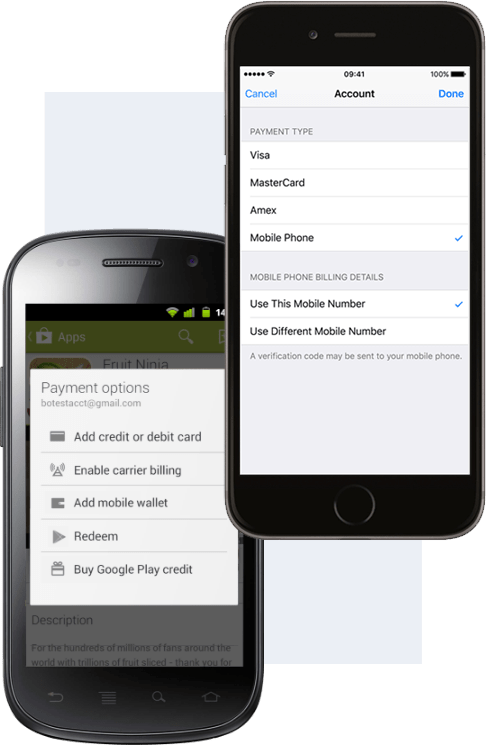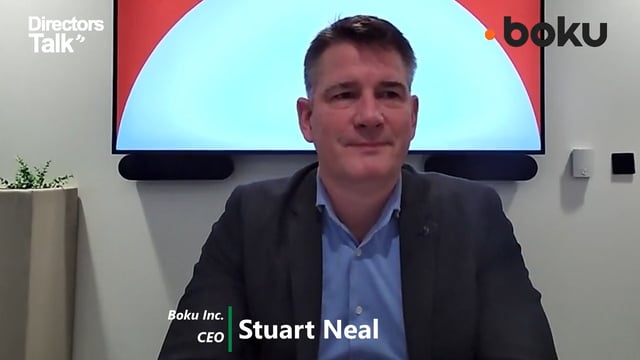Boku Inc (LON:BOKU) Chief Executive Officer Jon Prideaux caught up with DirectorsTalk for an exclusive interview to discuss their results and the trends they are seeing during the COVID-19 pandemic.
Q1: You spoke to DirectorsTalk earlier this month following your trading update and you’ve released your 2019 results today. One of the things we spoke about last time was the impact the COVID-19 pandemic was having on people’s behaviours and how that was possibly driving increased volumes for the company. Firstly, can you update us on any trends that you’re seeing as the COVID-19 lockdowns widen and more and more people are being restricted to their homes?
A1: One of the leading indicators in our business is new users and new subscribers and mostly, we see a pretty steady stream of new users and subscribers coming into the system, every month it’s about 1.5 million new people make their very first transaction.
When you’ve got this on a daily basis and you can see a direct correlation between when the countries’ go into some sort of lockdown or shelter at home status, there’s an immediate spike in those new subscribers or new users. It’s concentrated really, specifically, in streaming video so people obviously wanting to sign-up to new paid tv services, it’s concentrated in things like gaming whether that’s on consoles or PC’s and some extent app stores where I guess people are accessing those services. It doesn’t seem to be having much of an impact on music, mostly with music I guess a lot of people listen to music as they commute so it’s not so much an in-home driven thing.
Geographically, we’re seeing it in the countries that you would expect so in Europe, and you can literally see the effectiveness of a lockdown by looking at when these numbers or subscriptions spike and I can tell you the British lockdown seems to be more effective because the numbers seem to come up here. We’ve also seen it in Spain, in Italy obviously, in Belgium, in Germany, countries in the Middle East and in South-East Asia. Perhaps less in those countries in East Asia like Taiwan, Japan and Korea who are managing the epidemic with a test, track and trace type of strategy which meant they didn’t have necessarily so many people confined to their homes.
So, a very very clear correlation, an increase in new users pretty much immediately when a country goes into lockdown.
Q2: Looking back to 2019, the company grew significantly through the year. Can you talk us some of the highlights from 2019?
A2: Top line, revenues up $250 million, a 42% increase, we also had our maiden profit after tax so it was obviously quite a milestone for the company to report a profit at the very bottom line, or small one.
In terms of the underlying performance of the business, I think Payments performed pretty strongly. Revenues there up to $43.5 million, that’s inclusive of a non-recurring item and excluding that recurring item, we doubled the EBITDA to $12.7 million, up front $6.3 million.
On the Identity side, revenue was up 25% to $6.7 million, to be fair that was less than we had hoped but we are making progress on internationalisation, which is the real thing, the driver on the Identity business with launches of new connections in India and Indonesia. All of that increased revenues and so forth helped us to get the losses down to about $5.3 million on Identity.
So, all in all, we think it’s been a pretty encouraging year with progress across both of our divisions, albeit perhaps a little bit less as afar as Identify was concerned. Payments is clearly something that is able to demonstrate this great operational gearing, with this 100% EBITDA growth in the year.
Q3: Just looking forward, outside of the impact on payment volumes from the COVID-19 situation, what else can we expect to see from Boku this year?
A3: We’re obviously looking to try and launch more merchants across more carriers on direct carrier billing and most of those merchants will be higher margin settlement model merchants. In 2019, the emphasis was very much about building new connections and many of those connections were used by out lower margin transaction model merchants. That’ll change this year where we have much more in terms of settlement model merchants which will be good.
We hope to have progress on mobile wallets and this is something which I think is potentially a gamechanger for the company in the sense that it could double our total available market. So, with mobile wallets, what we’re trying to achieve is effectively to plug a second payment mechanism into our platform for the benefit of our merchants. These mobile wallets, mostly in Asian countries, are effectively the normal way in which people pay and they offer the potential of higher transactions, greater monthly spends. If we’re able to make those types of connections and to connect our merchants and have them starting to pay, the potential there could be pretty material.
We’ve done some progress as you’ve seen with the launch of Pearl Abyss, the South-Korean games developer and indeed with the launches last year of GrabPay and GoPay. The early signs are good and we would expect to be able to provide some more meaningful guidance at the half-year stage when we’ve got a few things going. We’ve contracted with 10 wallets in 9 countries, now we need to see how they actually start to perform.
Finally, on Identity, the progress in Identity will really be driven by our progress on internationalisation. As I mentioned earlier, we‘re pleased to see new connections going live in India and Indonesia, that helps drives the business forward and we’d expect to see many more new connections going live over the course of the year.








































